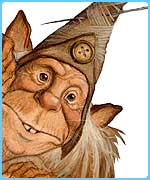The Bwbachod (Singular Bwbach) are members of the Tylwyth Teg; which translated into English literally means ‘The Fair Folk’. The Bwbachod (pronounced boo-ba-khod) are Welsh household spirits; a lot like Brownies.
According to Wirt Sikes in British Goblins (1880 – pp. 30-31), they have one outstanding characteristic; which is their dislike of teetotallers and of dissenting ministers. They very closely resemble Brownies. Both in their domestic helpfulness and their capacity for obstreperous and even dangerous behaviour when they are annoyed.
On the whole they are good-natured. They will do good turns for those who win their favour by a certain course of behaviour, recommended by long tradition. Sweep the kitchen and made a good fire last thing at night. Put the churn, filled with cream, on the hearth, with a basin of fresh cream for the Bwbach on the hob. Go to bed to await the event. In the morning you will find that the Bwbach has emptied the basin of cream. And will have plied the churn-dasher so well that the you just have to give it a thump or two to bring the butter in a great lump.
The Welsh Dictionary (GPC) gives a definition of bugbear, bogey, ghost, spectre, phantom.
I could go on and keep describing the Bwbachod and their traits. But I would rather do it in the true style of the oral tradition and tell you a story.
There was a Bwbach belonging to a certain estate in Cardiganshire, which took great umbrage at a Baptist preacher who was a guest in the house, and who was much fonder of prayers than of good ale. Now the Bwbach had a weakness in favour of people who sat around the hearth with their mugs of cwrw da (good beer) and their pipes, and it took to pestering the preacher. One night it jerked the stool from under the good man’s elbows, as he knelt pouring forth prayer, so that he fell down Hat on his face. Another time it interrupted the devotions by jangling the fire-irons on the hearth and it was continually making the dogs fall a-howling during prayers, or frightening the farm boy by grinning at him through the window, or throwing the maid into fits. At last it had the audacity to attack the preacher as he was crossing a field. The minister told the story in this wise
‘I was reading busily in my hymn-book as I walked on, when a sudden fear came over me and my legs began to tremble. A shadow crept upon me from behind, and when I turned round–it was myself!–my person, my dress, and even my hymn-book. I looked in its face a moment, and then fell insensible to the ground.’
And there, insensible still, they found him. This encounter proved too much for the good man, who considered it a warning to him to leave those parts. He accordingly mounted his horse next day and rode away. A boy of the neighbourhood, whose veracity was, like that of all boys, unimpeachable, afterwards said that he saw the Bwbach jump up behind the preacher, on the horse’s back. And the horse went like lightning, with eyes like balls of fire, and the preacher looking back over his shoulder at the Bwbach, that grinned from ear to ear.
British Goblins – Wirt Sikes 1880
The English word ‘hobgoblin’ may be derived from the Welsh hob, to hop, and coblyn, a goblin. Which brings a hopping goblin to mind. This also suggests the Pwca (with which the Bwbach is also confused). It should mean in English simply the goblin of the hob, or household fairy.
Getting a Bwbachold Helper
So, if you want to avail yourself of the help of a Bwbach remember to keep your kitchen swept and light the fire at night. Most importantly leave a bowl of cream out. Apparently they don’t like to be thanked. Just don’t fall foul of one.
